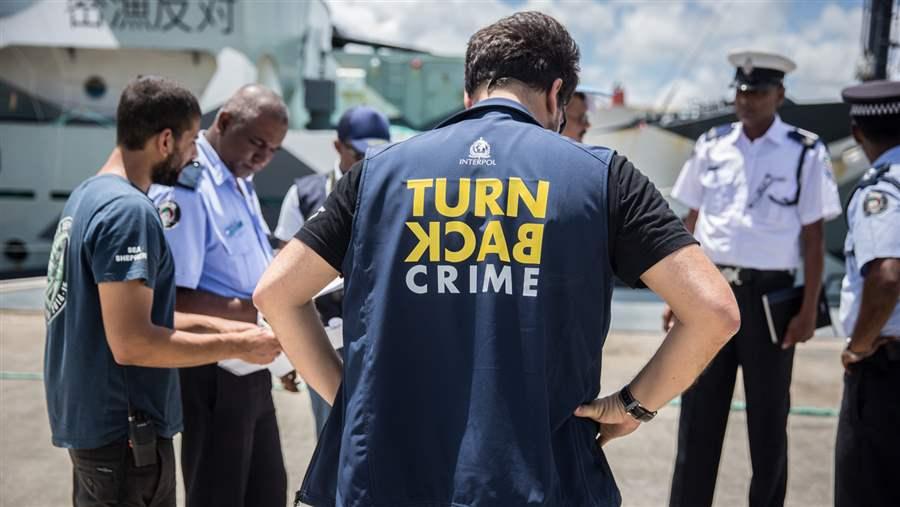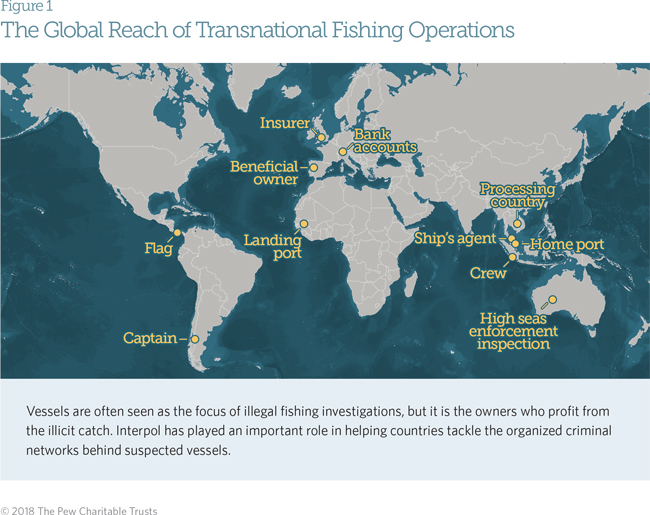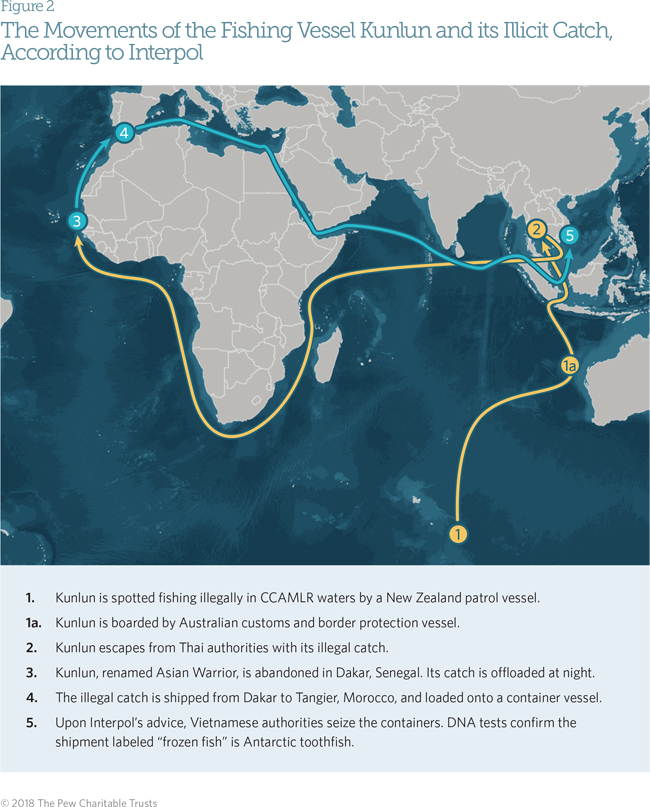How Interpol’s Project Scale Is Changing the Game in Illegal Fishing
The global law enforcement network is helping nations prosecute illegal fishing fleets throughout the world
This issue brief was updated April 10, 2018, to correct information on the Thunder’s names and flags and to clarify Nigeria’s role in its deregistration.
Overview: Crimes at sea
With over 70 percent of the Earth’s surface covered by water, only a small fraction of which is regulated by governments, it is no surprise that the high seas are growing more lawless each year. One of the most widespread threats is illegal fishing and its associated crimes. Each year, up to $23.5 billion worth of seafood is stolen from the seas through illegal, unreported, and unregulated (IUU) fishing. That translates into 26 million tons, or 1 in every 5 wild-caught fish sold on the market.1 Without proper law enforcement of the seas, illegal fishers will continue to maximize their profits through whatever means possible, robbing law-abiding fishermen, damaging marine ecosystems, and threatening the livelihoods of coastal communities that rely on fish for sustenance or income. Vessels that conduct this activity may often engage in other crimes, such as piracy and human trafficking, posing not just an environmental and economic risk, but a security risk as well.
Project Scale uses a team of experts in intelligence collection and analysis to help countries decipher the complex business networks behind illegal vessels.
These offenses taking place on the high seas—an area of the ocean beyond 200 nautical miles from a nation’s shore—within nations’ waters, or throughout the world’s ports, fall under what is known as fisheries crime. The term also covers a variety of other unlawful actions, including: documentation fraud, tax evasion and money laundering, drug and firearms trafficking, bribery, forced labor, and illicit trade. While advancements in technology and the adoption of international policies have helped deter illegal fishers, these criminals are always looking for a new avenue to exploit.
To address these mounting crimes at sea, Interpol, with support from Norway and a grant from The Pew Charitable Trusts, launched Project Scale in 2013. The project is working with Interpol’s 192 member countries to help them identify, stop, and prevent fisheries crime by exposing criminals and their networks.
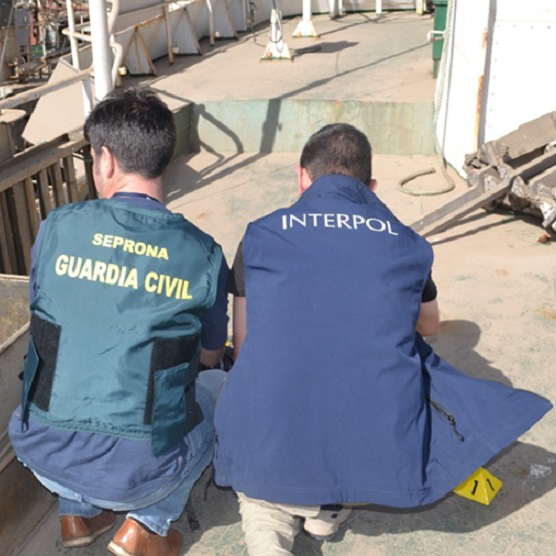
Members of an Interpol Investigative Support Team (IST) examine the Asian Warrior, formerly the Kunlun, in Dakar, Senegal.
SEPRONA—Guardia Civil
A key part of the project’s work is determining which vessels pose a high risk of carrying out illegal activity—those that have frequently changed their name and country of registration, used counterfeit identities or flags, fished as stateless vessels, or been involved with illegal fishing, illegal transshipping, or other illicit activity. Project Scale uses a team of experts in intelligence collection and analysis to help countries decipher the complex business networks behind these vessels. And with Interpol providing the framework, the project allows countries to securely share information and work together to catch criminals beyond their borders. Its assistance is critical given the challenges posed by multiple jurisdictions, permeable borders, scant monitoring and controls, and a lack of interagency cooperation.
What Project Scale has to offer
Criminal businesses in the fisheries sector identify and target weaknesses in national jurisdictions, such as weak legal frameworks, corruption, and lack of enforcement capacity both at port and at sea. Some have large international networks with subsidiary businesses and affiliated corporations that are registered in countries that have little oversight of their operations. By navigating gaps in regulation of the fishing industry, they circumvent detection and are able to profit from lucrative markets. These networks have also exploited a lack of communication among domestic law enforcement agencies and between countries.
Project Scale is proving effective at filling these gaps and coordinating a global law enforcement response. It is the only international platform with a policing mandate dedicated to fighting fisheries crime, and having Interpol as its base of operations has led to greater cooperation between national agencies and international partners. Interpol maintains a politically neutral environment for all member nations, with strict security and confidentiality protocols for sharing criminal intelligence and other sensitive information. This offers nations a trusted and secure hub to communicate with one another and streamline investigations across borders.
Project Scale’s team facilitates much of this communication, as well as synthesizes information that flows in, yielding a global perspective on criminal fishing activity and trends. When a country suspects that a vessel is engaged in fisheries crimes, it can issue a notice using Interpol’s international alert system.
The project’s team can also assess the needs of vulnerable or resource-poor countries to effectively address these crimes and link them with police expertise from other nations. It holds regional investigative meetings that are reinforced by workshops and training sessions.
The Project Scale team is made up of intelligence officers with police and fisheries enforcement backgrounds, multidisciplinary analysts, and legal and environmental crime specialists, with years of field experience. They are able to offer case-specific investigative support to member countries to help them track illicit proceeds, uproot criminal networks, and ultimately reduce IUU fishing and associated crimes worldwide.
Project Scale: Policing capabilities
- Fisheries Crime Working Group (FCWG): A group of countries with similar challenges in the fight against fisheries crime and the common goal of taking the fight to the next level. Open to any interested member nation, the group provides a platform for international cooperation. It holds annual meetings for national police, maritime agencies, customs, fisheries representatives, and tax authorities to work on specific programs that cover criminal intelligence and capacity-building.
- Investigative Support Teams (ISTs): At the request of member countries, these on-site teams support investigations that have elements of transnational crime. They provide support during high-risk vessel inspections and assist with evidence collection and police procedures, digital forensics, links to global police databases, language and technical support for interviewing suspects, and analysis of information collected.
- Regional Investigative and Analytical Case Meetings (RIACMs): These meetings are scheduled at the request of member countries and supported by Interpol. They allow law enforcement officers from member countries and their investigative teams to meet in person and work collaboratively on challenging transnational cases. RIACMs have helped identify company ownership, members, and assets—revealing criminal networks—and led to the exchange of information under international crime cooperation procedures, ensuring the transfer of evidence between jurisdictions.
- International Alert System: Interpol’s color-coded notice system allows countries to seek or provide information on the whereabouts of suspected criminals, emerging threats, or the modi operandi, objects, devices, and concealment methods used by criminals. The international environmental law enforcement community has used it to disseminate information and collect evidence to dismantle criminal networks behind several illegal fishing vessels.
- I-24/7: A secure messaging system that Interpol uses to transmit rapid alerts of imminent criminal activity or threats to its 192 member countries.
- National Environmental Security Task Forces (NESTs): Multidisciplinary teams consisting of experts from various national agencies (police, customs, coast guards, navies, environmental ministries, prosecution offices, etc.). These teams stem from or contribute to national task forces. Interpol has developed a guide to assist member countries in establishing NESTs.
- Criminal Intelligence Analysis Reports: Reports used to help officials, such as law enforcement officers and policymakers, address challenges with investigations. They provide warnings of impending threats and support operational activities. Reports can provide operational analysis—conducted to achieve a specific outcome, such as an arrest, seizure, forfeiture of assets, or disruption of a criminal group—or strategic analysis, which gives decision makers early warnings of threats, information on patterns of criminality or emerging criminal issues, or training on crime prevention techniques.
The Southern Ocean IUU fleet
Since its launch in 2013, Project Scale has played an integral role in taking down a notorious fleet of fishing vessels that had been plundering the Southern Ocean for more than a decade. They sought Patagonian and Antarctic toothfish, species so valuable to markets worldwide that they are referred to as “white gold.” A particularly good haul can net several millions of dollars. These vessels were suspected of transshipping their catch on the high seas, which allowed them to continue to fish for months at a time. Consisting of six fishing vessels—the Thunder, Kunlun, and four other vessels—the fleet had collectively hauled in more than $100 million worth of illicitly caught fish from 2013 to 2016, according to Interpol. In response to this threat, more than a dozen nations, working together through Project Scale, helped crack the case against two of these vessels and their owners.
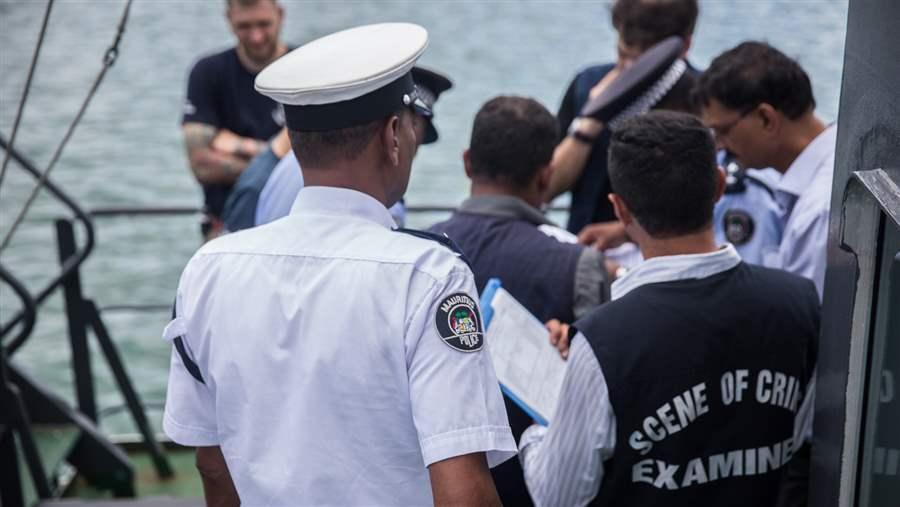
Mauritius police and Interpol officers examine evidence and collect eyewitness accounts of illegal fishing from the crew of Sea Shepherd Conservation Society.
Siddharth Chakravarty
The Thunder
One of Project Scale’s first targets was the Thunder, a vessel that had fished under eight names and changed its country flag seven times since 1969 to avoid attention from authorities.2 In December 2013, New Zealand issued a Purple Notice through the Interpol alert system requesting any information on the Thunder, which was then called Ming No. 5.3 As the vessel continued to switch identities, Interpol member countries updated one another on the vessel’s whereabouts.
The chase
In December 2014, the Thunder was spotted again in the Southern Ocean in waters protected by the Convention for the Conservation of Antarctic Marine Living Resources (CCAMLR), an international body with authority to manage fisheries in the Southern Ocean. The international organization Sea Shepherd Conservation Society had spotted the vessel and notified Interpol, along with Australia and CCAMLR’s secretariat.
As a Sea Shepherd vessel pursued the Thunder, Interpol began working with member nations to analyze its path and identify ports where it might try to offload its catch. The Project Scale team sent more than 50 alerts to member nations through its i-24/7 message system, warning them of a potential port call by the vessel and the likelihood it might attempt to rename or reflag to avoid authorities. Interpol also coordinated with Norway, Nigeria (the Thunder’s flag State), and South Africa to establish a plan for port authorities and deployment of an Interpol investigative support team (IST) to assist if needed.
As the Thunder made its way up the west coast of Africa, searching for a place to offload its catch, its crew faced diminished options because of the coordination between port States and countries that had information on the vessel’s previous activities. Such regional cooperation highlights the importance of port authorities exchanging information, a basic tenet of the Port State Measures Agreement, an international treaty aimed at closing ports of convenience to illegal fishing vessels. The Interpol operation was a successful test of provisions related to information sharing between nations.
As the chase wore on, Interpol issued a Purple Notice stating that the Thunder navigated evasively for about 60 days, winding its way up the western coast of Africa. In April, the vessel abruptly sank under mysterious circumstances off the coast of Africa, in São Tomé and Principe’s exclusive economic zone (EEZ). A nearby Sea Shepherd vessel rescued the Thunder’s Chilean captain, his Spanish officers, and Indonesian crew and sent boarding teams to try to recover evidence of illegal fishing before it sank. Computer files and samples of fish from the ship’s hold that they recovered were later used to build the case against the Thunder and its crew.
The investigation
When the captain and crew of the Thunder arrived ashore in São Tomé and Principe, they were met by coast guard officers, police, and fisheries authorities. The captain and senior officers were placed in police custody and their passports were seized. Project Scale quickly deployed an IST to the west African nation to help it conduct interviews and secure statements from witnesses. Interpol arranged for a Bahasa-speaking police officer from its Lisbon office to accompany the IST to enable the team to communicate with crew members and confirm that no one on board had been the victim of human trafficking or forced labor, practices that are common on IUU vessels.
According to a criminal intelligence officer at Interpol, while one Sea Shepherd vessel had chased the Thunder across the Southern Ocean, another had gone to retrieve more than 70 kilometers of banned gill nets that the Sea Shepherd alleged the Thunder abandoned in the water once the chase began. It took the nets to Port Louis, Mauritius, and transferred them to authorities there. On hand to witness the handover was a criminal intelligence officer, sent by Project Scale at the request of Mauritius officials, who collected witness statements and other evidence. The fishing nets were a key link to the vessel. Fishers are often particular about their gear, modifying it based on their experience and understanding of their target species. The gear’s parts and unique design can be treated almost like a “fingerprint” for that particular vessel or owner. In this case, Interpol helped Mauritius authorities analyze the gill nets so that they could eventually be compared with gear still aboard the Thunder.
Interpol also sent a Project Scale officer and a digital forensic team from Canada’s Department of Fisheries and Oceans to São Tomé and Principe to help its authorities extract and analyze data from mobile phones and computers that the Sea Shepherd had recovered aboard the Thunder. To ensure a secure chain of custody for this evidence—so that it could be used in law enforcement proceedings—Interpol told the Sea Shepherd crew members that they would need to hand over the phones and computers during their first port of call, in Bremen, Germany. Interpol then coordinated with Germany’s national police to ensure that they securely transferred the items to São Tomé and Principe’s national prosecutors.
The Thunder used typical methods to conceal its identity and illicit activity, operating within the gaps in international governance and oversight, according to the Purple Notice. As the vessel made its way from the Southern Ocean to Africa, Nigerian authorities noticed irregularities in its registration that prompted further investigation. At the time, the country did not issue fishing permits to domestic vessels fishing outside its EEZ, meaning the Thunder could not have legally procured one. According to Interpol, the Thunder’s operators targeted Nigeria because its fisheries laws didn’t extend to the high seas. The investigation revealed that the Thunder had probably operated with invalid safety and registry documents. On March 18, 2015, Nigeria de-registered the vessel.4
Legal actions
This collection of evidence paid off seven months later, when a court in São Tomé and Principe found the Thunder’s captain and senior crew members guilty of multiple environmental crimes, including pollution, recklessness, damage to the environment, and forgery. The three officers were sentenced to up to three years in prison and collectively were fined more than USD $17 million. Upon appeal in the São Tomé Constitutional Court, the prison sentence was overturned, but the financial penalties remained in place. São Tomé is working with Interpol and judicial authorities in Spain to recover the $17 million in penalties.
On Aug. 2, 2017, Spain’s Ministry of Agriculture, Food, and Environment (MAPAMA) initiated disciplinary civil proceedings against the 12 Spaniards linked to the ownership, management, and operation of the Thunder, and another suspected IUU vessel, the Tchaw. Fines associated with these charges could amount to €600,000 and include fishing bans or disqualification for fishing subsidies.5
The Thunder earned news coverage throughout the globe and is a prime example of how a single case can cover multiple jurisdictions. It showed that any nation—no matter its resources—can take decisive action against the most notorious IUU vessels in the world when backed by Interpol and cooperating member countries. With the international spotlight upon it, São Tomé and Principe delivered a court ruling against one of the most infamous vessels in the world, one that had been on CCAMLR’s Non-Contracting Party IUU Vessel List since 2006.6 The court’s decision was also important because it also addressed much of the collateral damage that IUU fishing inflicts upon the environment.
Keys to success
The Project Scale team’s ability to facilitate multinational investigative efforts was critical to ending the Thunder’s illegal fishing activities. Through careful planning and coordination, the Interpol network ensured that the vessel and its officers would be met with a law enforcement response no matter where the captain and crew attempted to land their catch. The case had several keys to success:
Dedicated effort: The case’s result was the product of years of work. An investigative task force had been used to exchange information on the Thunder, its activities, and business affiliations, since March 2014. Careful planning and coordination allowed countries to build the evidence against the vessel.
Worldwide alerts: When working alone, countries often lack adequate information about IUU fishing vessels and their illicit business networks. Interpol gives nations additional tools and connects them to other nations in ways that enhance their ability to piece together intelligence and build cases. In the case of the Thunder, Interpol’s worldwide alerts provided important information on the vessel’s most recent whereabouts, identity, and activities to keep nations watching for it.
Closing ports to IUU fishing: Port State controls—and communication between flag, coastal, and port States to make those controls work in practice—are an essential part of combatting illegal fishing. Project Scale played an important role in letting countries know where the Thunder was likely to be headed, through i-24-7 alerts, and facilitating regular meetings between officials to ensure that a coordinated law enforcement plan would be in place when the vessel arrived. While the Thunder sank before those plans could be executed, the case was an important exercise in implementing provisions required by the United Nations Food and Agriculture Organization Agreement on Port State Measures.
A secure chain of evidence: The handling and management of evidence is critical to a successful court case. Mauritius and Germany, connected through Project Scale, played a key role in helping to secure the evidence. Interpol criminal intelligence officers helped countries analyze the physical and digital evidence collected from the Thunder, connect the recovered fishing gear to the vessel, and provide links between the Thunder, its operating business networks, and other vessels active in the region as evidenced in the charges that were brought forward by the São Tomé authorities.
A global perspective: Interpol officers gave São Tomé and Principe information about the vessel’s background, including its past alleged illicit activities, and the operating network behind it. The information had been collected and pieced together by Interpol member nations. The ability to see the big picture, for a case file that covered multiple jurisdictions, is a critical piece of what Interpol provides to member nations across all of its areas of focus.
Crime convergence: There are many crimes that converge with the act of illegal fishing. In this case, charges brought by the São Tomé and Principe government against the vessel’s captain and officers included document forgery, reckless navigation, environmental damage to the marine ecosystem, and negligence. The types of crimes that can be prosecuted under most nations’ civil and criminal laws extend beyond traditional fisheries management provisions. Due to the wide variety of associated crimes and illicit activities that are associated with, and often facilitate, IUU fishing, these crimes should be fully investigated under all applicable parts of the law.
The Kunlun
Fisheries crime networks are often large-scale and complex, spreading their operations across a number of different countries to hide ownership of IUU vessels through layers of shell companies. They also change the names and other identifying information of their vessels, and use ports and flags of convenience to hide their activities and offload their illicit catch. This business model allows IUU vessel owners to exploit weak governance and lax regulations, and it limits the ability of any one nation to take action against the entire breadth of the criminal enterprise. To go after transnational criminal networks, law enforcement needs a coordinated, transnational approach. In the case of the fishing vessel Kunlun and other members of its IUU fleet, Project Scale provided the framework that allowed countries to take coordinated action.
The Kunlun and other members of the Southern Ocean IUU fleet had fished illicitly for toothfish for more than a decade, according to Interpol, hauling in thousands of tons of stolen fish in violation of conservation measures under CCAMLR. In 2003, the regional organization placed the vessels on its IUU list. Some member countries tried to take action against the vessels, but had limited success because they were fishing on the high seas— outside any country’s sovereign waters. As a result, the vessels’ owners continued to profit from the lucrative international trade with little risk of being caught. Spanish authorities estimate that in just five years, the Kunlun and two of its partner vessels, the Yongding and Songhua, took more than €80 million worth of toothfish.7
Things changed when countries started cooperating through Project Scale. In January 2015, the Kunlun was spotted by a New Zealand offshore patrol vessel, the Wellington, while fishing in the waters around Antarctica. Dangerous ocean conditions prevented the Wellington’s crew from boarding the Kunlun, but they were able to positively identify and photograph the vessel as it hauled in toothfish, noting its exact position and time and documenting an account of the activity. New Zealand immediately contacted Interpol and requested that three Purple Notices be issued for the Kunlun and two other suspected IUU vessels observed in the area.
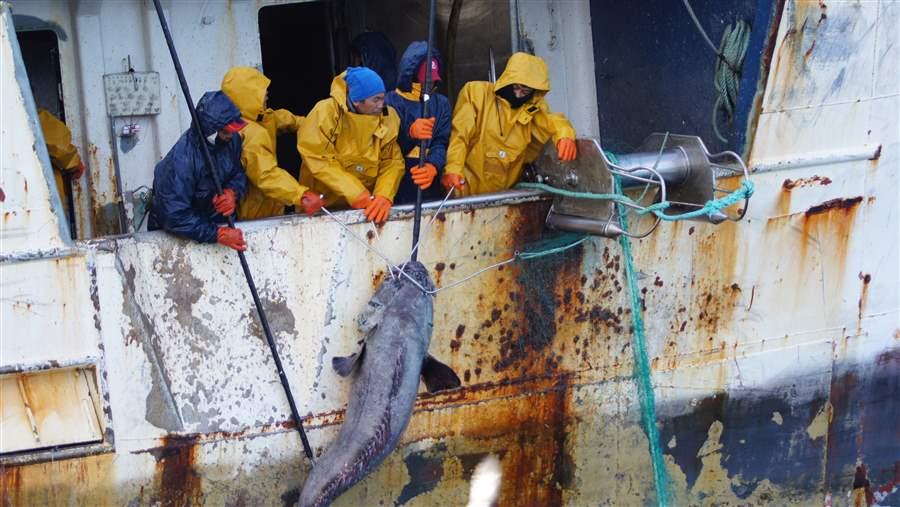
Crew members of the fishing vessel Kunlun retrieve a gill net with toothfish in the CCAMLR Convention Area.
New Zealand Government
The chase
In February, the Australian patrol vessel Triton spotted the Kunlun and was able to successfully board the vessel in international waters near Australia’s Cocos (Keeling) Islands. Limited in their jurisdiction on the high seas, the Australian officers gathered information on the vessel’s nationality, ownership, and authority to fish in the region. According to Interpol records, when the Kunlun arrived in Thailand a month later to offload its suspected illegal catch—renamed the Taishan and declaring its toothfish catch as grouper—Australia had already informed Thai authorities of the vessel’s illicit activity. It was held in port on suspicion of falsely declaring its catch and flag State, now claimed to be Indonesia.
While the vessel was detained, Interpol convened a RIACM at its Global Complex for Research and Innovation in Singapore. At the Project Scale team’s request, officials from Spain, Australia, Thailand, and several other countries investigating the vessel were present. The meeting provided an opportunity for the officials to exchange intelligence on the vessel’s operators and owners and inform countries in the region that served as either ports of call for the vessel, processing points for the fish, and/or destination markets. A key outcome was a report by Interpol criminal intelligence analysts that gave Spain all the intelligence collected and shared and allowed them to take the case forward against the Kunlun’s owners, who were based in Galicia, Spain.
Before Thai authorities could act, the Kunlun disappeared from port. The vessel had been allowed to partially refuel to power its refrigeration unit to keep the confiscated toothfish frozen while authorities concluded their investigation. When it became evident that the Kunlun had left, Interpol immediately began sending out i-24/7 messages, alerting countries where it might attempt to offload its catch. Authorities suspected, according to Interpol officers, that the vessel might head to Africa next to link up with the Yongding and Songhua, which had recently been sighted in Cabo Verde and had been determined by CCAMLR to have engaged in IUU fishing.
The investigation
In December 2015, authorities in Senegal contacted Interpol to report that they had discovered a vessel named the Asian Warrior in one of its ports, registered under the flag of St. Vincent and the Grenadines. It had been abandoned in Dakar by its captain and crew and its cargo hold was empty. Interpol relayed this information to Spain’s Guardia Civil, its national police force, which checked Spain’s national passport database and confirmed that five Spanish citizens linked to the Kunlun had traveled from Dakar to Madrid, Spain that month.
The Senegal Ministry of Fisheries and Maritime Economy requested assistance from Interpol, which deployed an IST that included Interpol officers and investigators from Spain’s Guardia Civil and MAPAMA. These investigators were working on criminal and civil cases, respectively, against the vessel’s owners. With Senegalese authorities, the Interpol and Spanish officers inspected the vessel and found several pieces of evidence that confirmed that the Asian Warrior was in fact the same vessel that had fled Thailand, the Kunlun. The team also recovered evidence that established a direct link between the vessel, a shell corporation registered as its owner, and individuals in Spain. Interpol hosted a second RIACM in Lyon, France, later that month that brought together representatives from the lead investigative units to share this new information and develop a mutual understanding of the modus operandi, the Kunlun’s activities and ports of call, and the movements of people, goods, and money.
Interpol officers worked with Senegal to trace the Kunlun’s catch as it was shipped via a Senegalese company to Morocco, and then transferred to a long-haul container ship bound for Vietnam, where it was to be sold. Before the ship arrived, Interpol alerted officials in the port of Haiphong, and Vietnamese authorities decided to hold the cargo for inspection for seven days—the maximum allowed under Vietnam’s laws—on suspicion that it was falsely declared and linked to the Kunlun’s illicit activity. With Interpol’s help, Spain convinced Vietnam to seize the 181 tons of toothfish, worth around $2.87 million, and collect samples for DNA testing.8 Spain’s national laboratory conducted the tests and confirmed the cargo was toothfish. This was necessary as Interpol said the Kunlun’s owners had changed cargo declarations several times during shipment to evade detection. Grouper, tuna, or simply “frozen fish” were just some of the labels used to try to throw authorities off the trail.
Interpol then arranged for a Senegalese officer to transfer the ship’s hard drives and other digital evidence recovered from the Kunlun to Interpol’s headquarters in Lyon. With support from Interpol’s digital forensics team, the officer recovered evidence from the ship’s computer hard drives and, with Interpol’s coordination, transferred the data securely to Spanish prosecutors. The Project Scale team also provided an analytical report compiling the information collected during the IST in Dakar, linking the vessel, geographic information on the voyage, phone records, photos of its crew, and companies associated with the vessel to support the investigations.
Legal actions
Over the next year, Spain’s Guardia Civil and MAPAMA took action against the owners of the Kunlun, Yongding, and Songhua. In December 2016, MAPAMA concluded its investigation into the company that owned the vessels, Vidal Armadores, and announced civil penalties against it, affiliated companies and seven individuals amounting to €16.75 million—the largest fine ever issued against European Union owners or operators of IUU fishing vessels.9 These fines were compounded by fishing bans ranging between five and 23 years, as well as prohibitions on obtaining subsidies or government support from five to 26 years.10 The ban on fishing meant that the company could not operate cold storage or other facilities, conduct fishing activities, or access government fishing subsidies. In essence, its operation was shut down.
Spanish police, supported by Interpol, arrested six people in raids carried out on March 7, 2016, in Galicia in northwest Spain, where the family-owned company was based. Based on the investigation into the network of companies and individuals linked to the illegal fishing fleet, the Kunlun’s operators were accused of environmental crimes related to damaging the protected CCAMLR area, money laundering, falsification of documents, and organized crime linked to the Kunlun, Songhua, and Yongding.11 Spain’s High Court convicted the individuals accused of these crimes, but they appealed the case to Spain’s Supreme Court, which acquitted them on the grounds that Spain lacks jurisdiction for these particular crimes committed on the high seas. Several environmental non-governmental organizations appealed the decision.
Keys to success
As with the case of the Thunder, Interpol used Purple Notices to alert the global community and initiate a request for assistance and information across its global police network. And RIACMs provided a framework for exchanging intelligence between countries. The Kunlun case, however, also demonstrates the complexity of investigating and prosecuting transnational fisheries crime, and the lengths to which transnational criminal networks will go to hide their operations and profits. But with Interpol’s assistance, Spain was able to mount a successful administrative investigation into the network that owned and operated the vessel. While the judicial outcome of the criminal case was challenged on the grounds of jurisdiction, the joint work through Project Scale proved that this mechanism can be used effectively to pursue an IUU network across borders. The case highlights these keys to success:
- Port State controls are effective in stopping IUU fishing: In warning Thailand of the Kunlun’s impending arrival, Australia operated through protocols defined in the Regional Plan of Action to Promote Responsible Fishing Practices including Combating Illegal, Unreported, and Unregulated Fishing in the Region. In May 2007, 11 countries including Australia and Thailand and four regional fisheries organizations endorsed this plan as a way to strengthen fisheries management in Asia and crack down on IUU fishing. The information exchanges between Australia and Thailand also align with both countries’ responsibilities under the 2009 FAO Port State Measures Agreement. This case highlights the importance of port State controls and communication between countries in order to achieve success.
- Interpol intelligence analysis uncovered the operating network: Intelligence analysis conducted by Interpol, Spain, and Senegal connected the vessel to its operating network and helped Spain build its case against the Kunlun and its owners. Connected through Project Scale, Senegal worked with Spain and a team of Interpol’s digital forensic analysis experts to analyze computer data that Senegalese authorities had recovered from the Asian Warrior. This analysis helped establish a link between the Kunlun and other alleged IUU vessels and several companies suspected of being part of the vessels’ operating network. Following the multinational RIACM meetings, Interpol analysts gave a report to Spain, combining all intelligence gathered through the network and regional case meetings, helping Spain to take its criminal case forward.
- Establishing the vessel’s identity: Fishing vessel owners and operators frequently change the name and other identifying information about their vessels to hide past activity. Interpol ISTs supported the crime scene investigation and analysis in a number of ways. After the Asian Warrior was discovered in Senegal, authorities there teamed up with Interpol and Spanish Guardia Civil officers to inspect the vessel. Criminal intelligence officers at Interpol said they found physical features and other evidence that was used to identify the vessel as the Kunlun.
- Tracing IUU products and trade flows: Interpol analysts worked with commercial transport companies to help track down the catch from the Kunlun and identify its destination port in Vietnam. With help from Project Scale, Spain issued a formal request for assistance from Vietnam to secure the Kunlun’s catch as evidence. Interpol coordinated with Spain and Vietnam to perform DNA analyses of the catch and identify its origin and species.
- The importance of strong laws against IUU fishing and associated crimes: Spain’s new IUU law was used to issue more than €16.5 million in civil penalties and up to 23 years in fishing bans against Vidal Armadores and several affiliates linked to the Kunlun, Songhua, and Yongding.12 This was one of the first times that it had been used and shows the importance of having strong national laws against IUU fishing. Spain also arrested six individuals linked to the vessels and initiated criminal proceedings against them, citing certain methods and activities—such as document fraud and money laundering—that are commonly associated with crimes such as drug trafficking but are often used to facilitate IUU crimes as well. Spain’s highest court acquitted them, stating that it lacked jurisdiction.
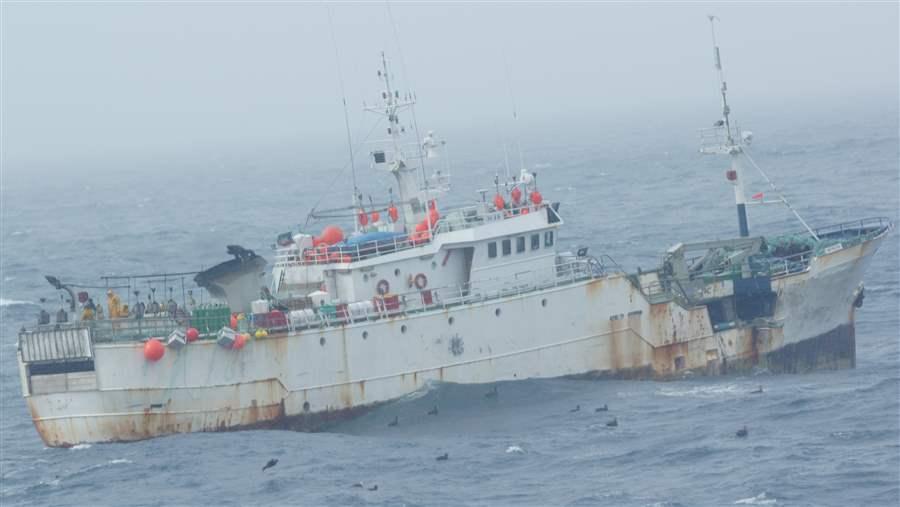
The Kunlun
Name: Kunlun / Taishan / Asian Warrior
Estimated catch (2015): USD $3.6 million
CCAMLR IUU vessel list: 2003–2016
Interpol Purple Notice issued Jan. 13, 2015
Crew count: 36
Gross tonnage: 656 tons
Length: 48.21 meters
Fishing method: Gill net
Suspected Activities:
- Changing name and flag State
- Fleeing from custody
- Using ports or flags of convenience
- The Kunlun and its operators changed its cargo declarations to obscure the identify of its
catch and avoid detection:
CCAMLR (origin): Toothfish (true identity)
Thailand: Grouper
Senegal: Frozen Fish
Morocco: Tuna
Vietnam: Frozen Fish
New Zealand Government
Opportunities for action
Project Scale’s success relies on vigilance and collaboration among Interpol’s 192 member countries. Here are ways that a country can get involved.
- In suspected cases of illegal fishing involving a foreign-flagged vessel or where the case involves a transnational issue, consider using Interpol Purple Notices to alert countries of illicit activity and to gather information on the vessel’s whereabouts and activities.
- Make efforts to communicate and build stronger relationships between fisheries enforcement and management officials and national police officers. Interpol provides assistance in making these connections.
- Consider becoming a participating member of the Fisheries Crime Working Group as a way to gather more information and develop cases against IUU fishing.
- Contact Project Scale [[email protected]] to learn more about specific expertise and technical assistance available. Interpol officers can enlist the help of other countries to provide this technical expertise.
Conclusion
The ocean is vast, and enforcing fishing regulations can pose a daunting challenge. Nations often feel powerless to stop IUU fishing because they may be missing a critical piece of evidence that would allow them to take action. Project Scale is proving effective at filling such gaps. Its team is helping to identify suspicious behavior, notifying member countries, and giving authorities a global network to tap when they pursue vessels. Project Scale’s success is sending a message to illegal fishers around the world that there are no safe harbors.
Endnotes
- David J. Agnew et al., “Estimating the Worldwide Extent of Illegal Fishing,” PLoS ONE 4, no. 2 (2009): e4570, http://www.plosone.org/article/info:doi/10.1371/journal.pone.0004570.
- Interpol, “Norway Requests First Interpol Notice for Illegal Fishing,” press release, Sept. 6, 2013, https://www.interpol.int/News-and-media/News/2013/PR104.
- Ibid.
- Interpol, “Interpol Purple Notice: Modus Operandi,” issued April 23, 2015.
- Ministry of Agriculture, Food, and Environment (MAPAMA), “El Ministerio de Agricultura, Alimentación y Medio Ambiente ha notificado la Resolución sancionadora: La Resolución del expediente de la Operación Sparrow sanciona a 9 empresas y 7 personas físicas por su implicación en la actividad de buques que han incurrido en pesca ilegal,” press release, March 17, 2016, http://www.mapama.gob.es/eu/prensa/noticias/la-resolución-del-expediente-de-la-operación-sparrow-sanciona-a-9-empresas-y-7-personas-fÃsicas-por-su-implicación-en-la-actividad-de--buques-qu/tcm9-415229-16; Ministry of Agriculture, Food, and Environment (MAPAMA), “El Ministerio inicia un expediente sancionador por presunta pesca ilegal contra los propietarios y gestores de dos buques,” press release, Aug. 2, 2017, http://www.mapama.gob.es/es/prensa/noticias/el-ministerio-inicia-un-expediente-sancionador-por-presunta-pesca-ilegal-contra-los-propietarios-y-gestores-de-dos-buques/tcm7-464599-16.
- Commission for the Conservation of Antarctic Marine Living Resources, “Vessel Compliance: Thunder,” accessed Dec. 5, 2017, https://www.ccamlr.org/en/node/86371.
- Miguel A. Pacheco, “Operation YuYus Vidal Case General Overview,” Fisheries Crime Symposium 2016, Yogyakarta, Indonesia, Oct. 10-11, 2016, http://fishcrime.com/wp-content/uploads/2016/10/Presentation_Miguel-Pacheco.pdf.
- Ibid.
- Ministry of Agriculture, Food, and Environment (MAPAMA), “El Ministerio de Agricultura, Alimentación y Medio Ambiente ha notificado la Resolución sancionadora: La Resolución del expediente de la Operación Sparrow sanciona a 9 empresas y 7 personas físicas por su implicación en la actividad de buques que han incurrido en pesca ilegal,” press release, March 17, 2016, http://www.mapama.gob.es/eu/prensa/noticias/la-resolución-del-expediente-de-la-operación-sparrow-sanciona-a-9-empresas-y-7-personas-fÃsicas-por-su-implicación-en-la-actividad-de--buques-qu/tcm9-415229-16.
- Ibid
- Pacheco, “Operation YuYus Vidal Case General Case Overview.”
- Ministry of Agriculture, Food, and Environment (MAPAMA), “El Ministerio de Agricultura, Alimentación y Medio Ambiente ha notificado la Resolución sancionadora: La Resolución del expediente de la Operación Sparrow sanciona a 9 empresas y 7 personas físicas por su implicación en la actividad de buques que han incurrido en pesca ilegal,” press release, March 17, 2016, http://www.mapama.gob.es/eu/prensa/noticias/la-resolución-del-expediente-de-la-operación-sparrow-sanciona-a-9-empresas-y-7-personas-fÃsicas-por-su-implicación-en-la-actividad-de--buques-qu/tcm9-415229-16.
